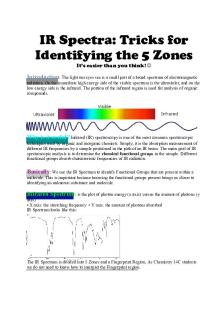IR Theory – Lecture 5 Neorealism and Neoliberalism PDF

| Title | IR Theory – Lecture 5 Neorealism and Neoliberalism |
|---|---|
| Author | Mayeul Ponroy |
| Course | International History and International Relations |
| Institution | University of Kent |
| Pages | 9 |
| File Size | 852 KB |
| File Type | |
| Total Downloads | 34 |
| Total Views | 129 |
Summary
Master Level Lecture on Neorealism and Neoliberalism in International Relations Theory...
Description
IR Theory – Lecture 5 Neorealism and Neoliberalism
Waltz: Man, the State and War •
Argues in MSW that the cause of war is not human nature or the state, but rather that the international system is responsible for war.
•
MSW – a work very much in the classical mould. History, philosophy and political theory predominate as the means of analysis.
•
But even here there is the beginnings of a break with ‘classical’ Realism as Waltz disengages Realism from the idea of human nature.
Waltz, Theory of International Relations: - Waltz spends 20 years trying to study the behavioural and scientific revolutions - From initial scepticism, he embraces the idea of a scientific study of IR - Publishes the Theory of International Politics in 1979. He judges his book to be the first theory of IP as the others were at the stage of pre-theory or were to reductive (describing parts of the system rather than the system itself) Waltz’ meaning / definition of theory:
- Deductive basis in theory (associated to realism) is flawed according to Waltz. - Waltz insists on the fact that theories should be systemic, elegant, simple and avoid complexity Reminder: Morgenthau thought this a perversion of the natural sciences. Waltz on the structure of theory: - Structure is a prerequisite for theory as it is structure that enables students of IP to determine the nature of international politics - Structure emerges from the interaction of states, but in turn it constrains them from taking certain actions and encourage them to undertake others. balance of power Ordering Principles to the creation/foundation of a theory: - Condition of anarchy - Balance of power theory - In a rational, self-help environment, balancing against the most powerful is best long-term means of preserving autonomy - Foundation = the rational self-interest of Homo Economicus
– (Homo Politicus very similar) Neorealism since 1979: - Neorealism has effectively become Realism in the minds of academics and students. - When people write about a paradigm of realism they are really speaking of neorealism
Neorealism Reformation or Rejection of Realism:
(see lecture slides)
Part 2 of Lecture: Neoliberalism / Neoliberal Institutionalism
Neoliberalism / Neoliberal Institutionalism
- Emerges as an explicit critique of Realism - Claims to provide better theory to IP than realism - Realism (according to Keohane and Nye): state, force Context: - End of Cold War - Economic crises: oil crisis; debt crisis; US in relative decline; Japan and Germany were rising trading powers; trading powers were rising as opposed to military powers; détente and the decline of military power. Task of theory: to describe and explain this transition Epistemology: - Progressive vs. regressive theories - Contain inviolable assumptions and initial conditions defining their scope.
Key concept: complex interdependence
- Multiple Channels Connect Societies – informal ties between political elites (governmental and non-governmental) - Informal ties between political elites and economic actors. Neoliberals argue that military sector does not dominate the international agenda Neoliberals argue that different issues produce different regimes (e.g. Taxation, normally seen as a domestic issue, but it has international dimensions) 3 different levels of global political activity: - Interstate (traditional int. politics) - Transgovernmental (relations above and below governments) - Transnational (flow of goods, money, services and peoples) Agenda Setting – Essential process in IR - Bargaining despite asymmetric dimension
Absolute Gains vs. Relative Gains:
For Neoliberalism, absolute gains downplay the notion of relative gains, if everyone is gaining it does not matter that one is gaining 20% of available income and the other is gaining 80%
Interwar Idealists vs. Neoliberals...
Similar Free PDFs

6. Green Theory and IR
- 2 Pages

IR Theory 101
- 7 Pages

IR Theory Crash Course
- 15 Pages

Lecture 5 - Agency Theory
- 3 Pages

Lecture 5 - Strain Theory
- 5 Pages

IR-chapter 2 - IR lecture notes
- 18 Pages

Ir 5 zones
- 7 Pages

5.Game theory - Lecture notes 5
- 9 Pages
Popular Institutions
- Tinajero National High School - Annex
- Politeknik Caltex Riau
- Yokohama City University
- SGT University
- University of Al-Qadisiyah
- Divine Word College of Vigan
- Techniek College Rotterdam
- Universidade de Santiago
- Universiti Teknologi MARA Cawangan Johor Kampus Pasir Gudang
- Poltekkes Kemenkes Yogyakarta
- Baguio City National High School
- Colegio san marcos
- preparatoria uno
- Centro de Bachillerato Tecnológico Industrial y de Servicios No. 107
- Dalian Maritime University
- Quang Trung Secondary School
- Colegio Tecnológico en Informática
- Corporación Regional de Educación Superior
- Grupo CEDVA
- Dar Al Uloom University
- Centro de Estudios Preuniversitarios de la Universidad Nacional de Ingeniería
- 上智大学
- Aakash International School, Nuna Majara
- San Felipe Neri Catholic School
- Kang Chiao International School - New Taipei City
- Misamis Occidental National High School
- Institución Educativa Escuela Normal Juan Ladrilleros
- Kolehiyo ng Pantukan
- Batanes State College
- Instituto Continental
- Sekolah Menengah Kejuruan Kesehatan Kaltara (Tarakan)
- Colegio de La Inmaculada Concepcion - Cebu







